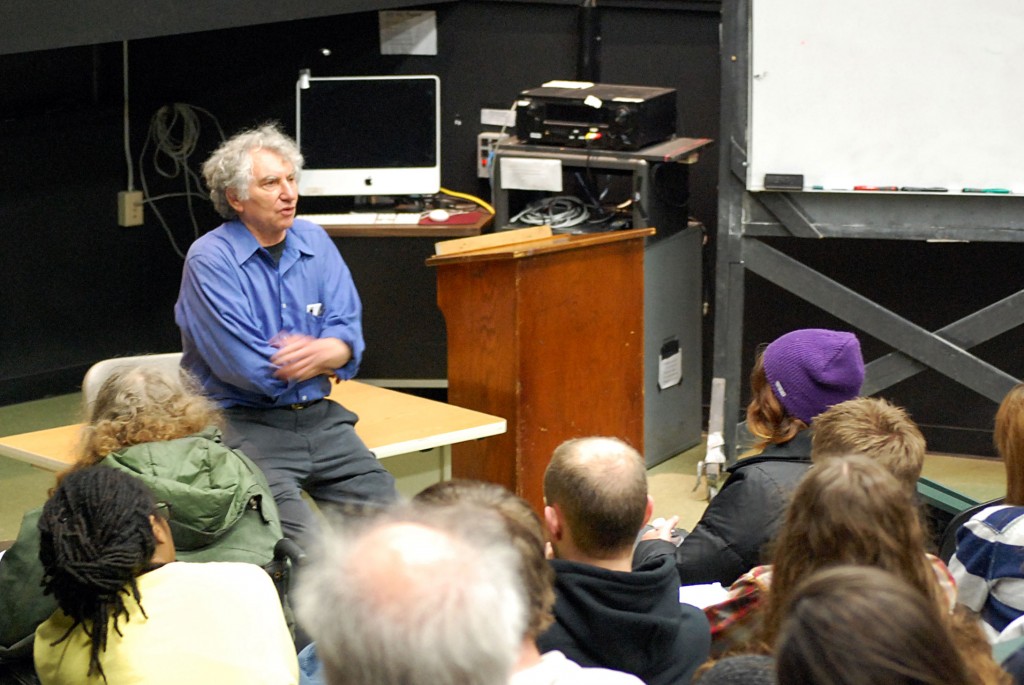Ken Jacobs, renowned experimental filmmaker and founder of Binghamton University’s cinema department, returned to campus on Tuesday to screen recent works and speak with students, staff and other guests about his life in experimental cinema.
Jacobs is the second filmmaker to come to BU for this semester’s Visiting Artists series organized by the cinema department.
Audience members had to fill the aisles after Lecture Hall 6 filled up beyond its 100-person capacity.
Vincent Grenier, a cinema professor and the organizer of the Visiting Artists series, introduced Jacobs, who has received many honors during his more-than-55-year career, including last year’s Film Critics Award for his film “Seeking the Monkey King.”
“Ken is no less than a major icon in avant garde cinema since the ’60s,” Grenier said. “I don’t know anyone who’s had this kind of impact on people who express themselves through cinema and on his students.”
Jacobs screened “Seeking the Monkey King,” as well as three short films — “Street Vendor,” “The Green Wave,” and “Ronald Gonzalez, Sculptor.” Each of the videos was non-narrative and featured heavy use of flickering images, digital distortions and optical illusions.
“I like the illusion and the confession of the illusion that it is an illusion,” Jacobs said. “That keeps things lively.”
“Monkey King,” which premiered in October at the New York Film Festival, was screened again in Zuccotti Park during the Occupy Wall Street movement in November. The film features slides of text that deride democracy and the American dream as illusions.
“There’s a Chinese film, ‘The Chinese Odyssey,’ which features the Monkey King,” Jacobs said. “I began making my own film to show a favorable portrait of the Monkey King. But with all these horrific things going on, that my country is doing, that the government is doing, the character of the Monkey King changed into a greedy ape rather than the childish wonder that the Chinese Monkey King represents.”
He said he had little control over the process and is baffled by the final product.
“It comes through me, but that’s all,” Jacobs said. “I have my name attached to it, but only by a thread. It’s running away, I’m just trying to hang on.”
Jacobs founded the cinema department, the first in the SUNY system, in 1969 with fellow filmmaker Larry Gottheim. He still holds the title of distinguished professor emeritus in the department.
Students petitioned the University to hire Jacobs as a professor after he presented a week-long guest seminar, according to the cinema department website.
“Despite his lack of a high school diploma, the administration — during that special period of anguish and possibility — decided that, as a teacher, he was ‘a natural,’” the website said.
Jacobs was a professor on campus until 2002.
“He was a big part of the department for over 30 years,” Grenier said. “I think it was an emotional experience for him coming back to the rooms that he once haunted for so long.”
Jacobs said he thinks it is crucial for people with skills to give back to educational institutions.
“There’s this saying, ‘those who do, do. Those who can’t do, teach,’” Jacobs said. “I had the fortune of having a great teacher who was also a great artist who got me away from that mentality. It’s a good thing, because otherwise I probably would have been too vain to teach.”
Jacobs began his own artistic education under the tutorship of abstract impressionist painter Hans Hofmann in the 1950s. Jacobs said that after this experience, he has “always remained painting conscious.”
“Painting starts from flatness,” Jacobs said. “Then things start to come out and you experience this dynamic flux. That was the biggest lesson for me as I traveled into cinema.”
His lessons in painting taught Jacobs to appreciate the two-dimensional canvas and its ability to create three-dimensional illusions.
“I have a fascination with depth, with the illusion of depth,” Jacobs said. “The screen has a certain 2D ambiguity. Things can be where you think they are, and then they’re somewhere else. You can create irrational spaces … It’s another way of perceiving the world.”
For Jacobs, this process of making people look at things differently is one of the most important responsibilities of an artist.
“Artists stir things up, make things unfamiliar again,” he said.
Jared Biunno, a freshman majoring in cinema, said he was excited about the screening.
“I’m in [CINE]122 and I’ve heard a lot about his films,” Biunno said. “He’s won a lot of awards and I’m really excited to see his work.”
Grenier said that he thought the event was a success.
“I had a discussion this morning [Thursday] with my video making class and there was a very enthusiastic response,” Grenier said. “There was an enthusiastic response on Tuesday night as well, even from students who don’t usually like experimental film.”



